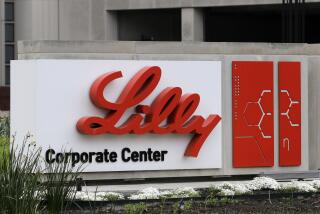Science / Medicine : Approved Drug Ineffective in New Alzheimer’s Study
- Share via
The only government-approved drug for treating Alzheimer’s disease appears to be completely ineffective, researchers reported last week. A study involving 80 people with the degenerative brain condition found no evidence that the drug Hydergine could improve their mental capacities, said Dr. Troy Thompson II of Jefferson Medical College in Philadelphia.
In the study, 39 Alzheimer’s patients were given oral daily doses of Hydergine for 24 weeks while 41 patients received a placebo. Those in the Hydergine group averaged 72 years of age and those in placebo group had an average age of 70.
At the start of the study, participants were given a series of tests to measure their mental capacity. The tests were repeated after the 24-week treatment period. “The Hydergine-LC group did not perform better after treatment than the placebo group on any test,” the researchers reported, “and its performance was worse” on one cognitive and one behavioral measure than that of the placebo recipients.
The mental abilities of both groups deteriorated during the treatment, and there were indications from the test results that “the Hydergine-LC group actually had more deterioration than the placebo group.”






